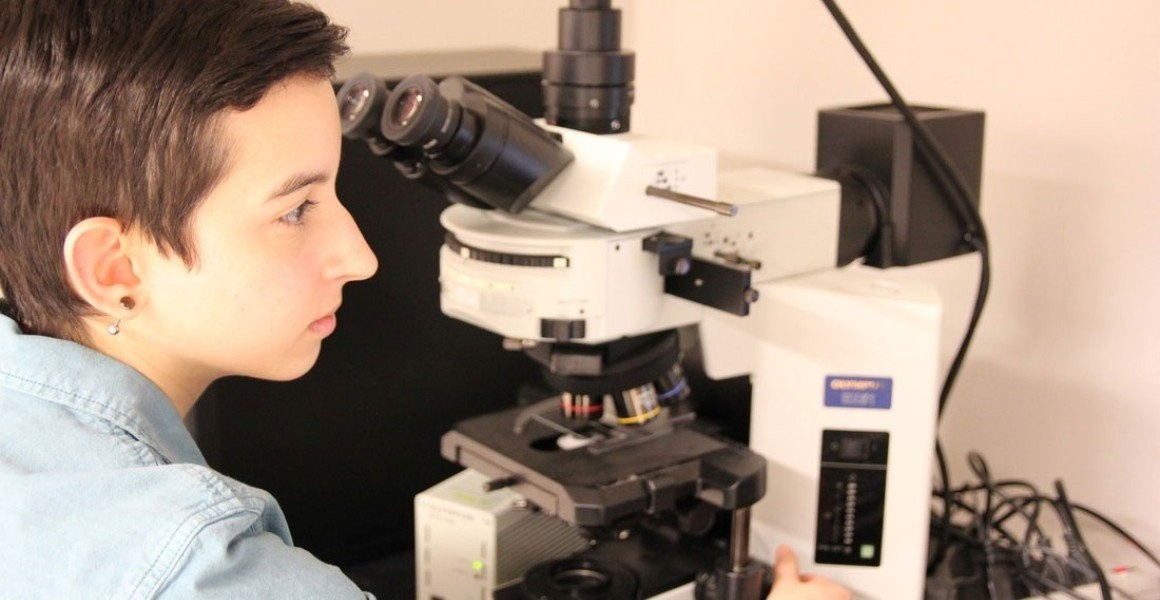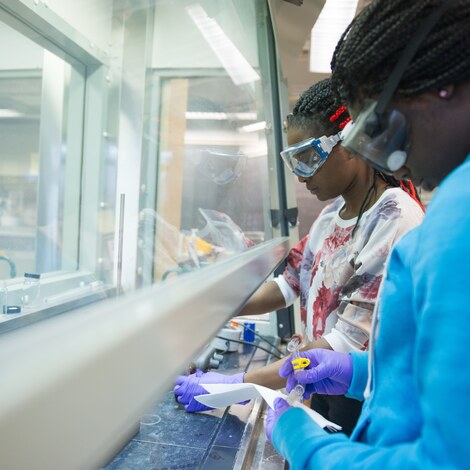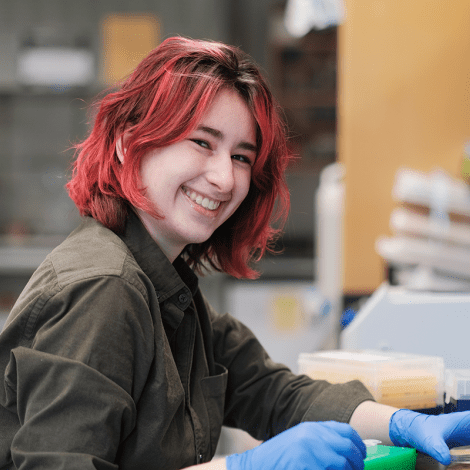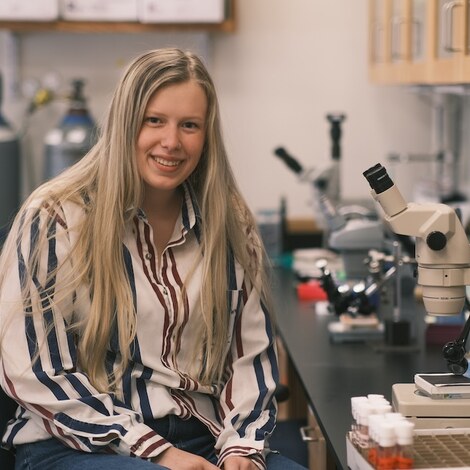All students regardless of background preparation are required to begin their study of chemistry with either CHEM-150 General Chemistry: Foundations or CHEM-160 Integrated Introduction to Biology and Chemistry (must be taken concurrently with BIOL-160).
CHEM-150 General Chemistry: Foundations
This course introduces fundamental principles of chemistry and prepares students to begin study in inorganic, organic, and analytical chemistry at the intermediate level. Topics include quantitative relations in chemical reactions, elementary thermodynamics, and atomic and molecular structure. This course emphasizes and supports the development of quantitative reasoning and argumentation skills. Includes laboratory.
CHEM-160 Integrated Introduction to Biology and Chemistry
This 8-credit course serves as a gateway to both the biology and chemistry core curricula. The course introduces and develops fundamental concepts in chemistry while also exploring the diverse range of strategies adopted by living systems to survive in different environments. This course prepares students for further study in chemistry and/or biology (BIOL-200). Students must register for both BIOL-160 and CHEM-160 as well as a single lab section (listed under CHEM-160L). Recommended for students interested in completing pre-health requirements or advanced study in biochemistry or neuroscience, and for those students seeking an intensive experience in chemistry and biology.
CHEM-199 Introduction to Research
This seminar is for first-year students who have a strong interest in the chemical sciences and will help to prepare them for scientific research. Students will be exposed to various research topics through reading, discussing, presenting, and writing about primary literature and attending selected department seminars. Throughout the semester students will carry out one research-style project in order to gain experience with the multifaceted nature of scientific inquiry. To jump start their research career on campus, each student will arrange meetings with at least two science faculty followed by a presentation and a written description on the faculty members' research topics.
CHEM-202 Organic Chemistry I
This course introduces the core principles of the language of organic chemistry and extends their use to the description of the behavior and reactivity of carbonyl containing functional groups. Topics include representation and naming, the use of various spectroscopic approaches to probe molecular structure, an overview of bonding models and molecular geometry, the development of mechanistic drawing, and the application of this mechanistic approach to the reactions of a wide range of carbonyl compounds. The accompanying laboratory course emphasizes the connections between the observable behavior of organic substances and their molecular structures. The laboratory curriculum introduces the essential techniques of preparation, purification, and spectroscopic analysis of organic compounds, with emphasis on both physical manipulations and their underlying chemical rationale.
CHEM-211 Environmental Chemistry
This course serves as an introduction to environmental chemistry and will apply foundational chemistry concepts to an understanding of how environmental problems are identified and remedied. This course will broadly survey national and global environmental issues, along with local case studies, with a focus on the chemistry of the atmosphere, water, and energy production. Topics will include tropospheric air pollution, stratospheric ozone depletion, climate change, natural water chemistry, water treatment, and energy production technologies.
CHEM-223 Chemical Measurement and Analysis
This course serves as an introduction to quantitative analytical chemistry and measurement. Topics to be covered include: aqueous statistical and error analysis, titrimetric and gravimetric analysis, and sample preparation techniques. In the laboratory, students will apply techniques covered in lecture to quantitation of a variety of analytes, and they will also learn the fundamentals of method development and optimization.
CHEM-231 Inorganic Chemistry
An introduction to the chemistry of elements. Topics include atomic structure and periodicity, symmetry, bonding theory, chemistry of the main-group elements and coordination chemistry. Laboratory introduces computational, preparative, and spectroscopic techniques.
CHEM-291 Scientific Illustration and Data Visualization
Doing experiments and gathering data are important, but far from the entirety of the scientific process. Understanding and communicating experimental outcomes often heavily rely on our ability to visually represent them. In this course, we will explore best practices for organizing and representing data, and learn how the choices we make influence the message our representations communicate. We will also develop a set of good design principles for scientific figures, and learn to prepare high quality plots and graphics for use in presentations, posters, reports, theses, and papers.
CHEM-295 Independent Study
In this class, students will acquire hands-on and/or applied experience in diverse aspects of the research process in any field of Chemistry under the direction and supervision of a faculty advisor. Typically, these projects are related to the research program of the advisor. Student experiences often include: familiarizing themselves with a research topic, generating interesting questions, designing experiments, acquiring technical and instrumentation skills, collecting and analyzing data, writing and/or presenting their results. To inquire about enrollment, students should fill out the application form available on the departmental website. The application is generally available each semester with a deadline immediately following the advising period, and faculty meet before the end of the semester to place students in labs for the following semester. Enrollment into a research opportunity depends on lab capacity, often not all applications are able to be fulfilled. A single credit requires an average of 3 hours of work per week. (Note: Some faculty may require a set weekly meeting time for a portion of this class.)
CHEM-302 Organic Chemistry II
This course provides a direct continuation of Organic Chemistry I (CHEM-202) and develops and extends many of the concepts and approaches developed therein. Topics include stereochemistry, substitution and elimination reactions, conformational analysis, addition reactions of multiple bonds, substitution reactions of aromatic systems, and a broad extension of the carbonyl chemistry introduced in the preceding class. Consideration will be given to the development of organic syntheses of specific materials and attendant issues of compatibility and selectivity in reaction choice. The scope and reach of the spectroscopic methods introduced in Organic Chemistry I will be extended and applied to structure determination. The accompanying laboratory course provides additional practice with the techniques of preparation, isolation, purification, and chemical and spectroscopic analysis of organic compounds. Mechanistic interpretation of results, in-depth analysis of spectroscopic data, and the development of synthetic protocols are areas of special emphasis.
CHEM-306 Analytical Chemistry
This course serves as an advanced course in analytical chemistry, with a combined emphasis on both classical analysis tools and commonly used instrumental techniques. Topics to be covered include figures of merit, statistical and error analysis, titrimetric and gravimetric analysis, and sample preparation techniques. Instrumental methods covered will include atomic/molecular spectroscopy, chromatography and mass spectrometry. In the laboratory, students will apply techniques covered in lecture to quantitation of analytes commonly seen in pharmaceutical, forensic, chemical and biological settings, and will also emphasize method development and optimization.
CHEM-308 Chemical Thermodynamics with Lab
A consideration of the contribution of thermodynamics to the understanding of the 'driving forces' for physical chemical changes and the nature of the equilibrium state. Topics will include statistical mechanics, thermodynamics, and kinetics.
CHEM-309 Introduction to Materials
This integrated lecture/lab course provides an introduction to different types of materials, including metals, ceramics, polymers, and composites, emphasizing structure and property relationships. The principles behind the design and implementation of materials as well as advances in materials in the areas of nano-, bio-, and electronic technology will be presented. Class time is split among lecture, discussion, and laboratory.
CHEM-312 Chemistry of Biomolecules
An examination of the major ideas of biochemistry from the point of view of the chemical sciences rather than the life sciences. The focus will be on structure and reactivity of important biomolecules and the role of energetics and reaction dynamics in biochemical processes. Major metabolic pathways are covered, including those of proteins, carbohydrates, lipids, and nucleic acids.
CHEM-320 Introduction to Nanoscience and Technology
This course will offer an introduction to nanoscience and nanotechnology by providing an overview of the synthesis of nanoparticles, the fabrication and preparation of thin films, the use of nanolithographic techniques, and the characterization of nanoparticles and films. Instrumentation developed to analyze nano-structured materials, including both spectroscopic and microscopic techniques, will be covered. An exploration of contemporary applications of nanotechnology, including environmental implications and assessment, will also be included. Class time is split among lecture, discussion, and laboratory work.
CHEM-324 Atomic and Molecular Structure
This course is an introduction to experimental and theoretical approaches to the determination of the structure of atoms, molecules, and chemical bonds. Classroom work provides background in the theory of atomic and molecular structure and an introduction to quantum mechanics and spectroscopy.
CHEM-325 Atomic and Molecular Structure with Lab
This course is an introduction to experimental and theoretical approaches to the determination of the structure of atoms, molecules, and chemical bonds. Classroom work provides background in the theory of atomic and molecular structure and an introduction to quantum mechanics and spectroscopy.
CHEM-326 Poisons: Death by Chemistry
This course uses a Problem-Based Learning approach to look at the effect of poisons at the molecular, cellular, and physiological levels from the chemistry and biochemistry perspective. We'll discuss: the classification of poisons and the common structural elements of the molecules within each class; the interaction of toxic molecules with proteins and nucleic acids present in the cell; the physiologic effect of toxins on different systems of the body; dosage effects and pharmacokinetics; the mechanisms by which antidotes work; and the analytical techniques that toxicologists use to determine which poisons are present in the body. The different classes of poisons will be discussed in the context of historical case studies.
CHEM-329 Cosmetic Chemistry
This course will introduce the chemistry, formulation, and physical characteristics of personal care products. The topics will include basic skin physiology, hygiene products, adornment products for face, nail, and hair, as well as current trends and advances in cosmetic dermatology. An integral part of the course will involve hands-on experience in making and characterizing some common skincare and cosmetic products.
CHEM-330 Advanced Topics in Chemistry
CHEM-330RN Advanced Topics in Chemistry: 'The RNA World: The Origin of Life to Modern Cells'
RNA is believed by many to have been the first macromolecule to evolve. In a hypothesized "RNA world," RNA would have simultaneously served the roles of carrying genetic information and catalyzing chemical reactions within early cells. The past three decades have been a renaissance for RNA biology, as researchers have uncovered the critical role RNA plays in eukaryotic and bacterial gene regulation and defense, as well as the potential for RNAs to perform catalysis. This seminar will introduce students to modern approaches to study the structure and function of RNA and will explore the chemical and biological roles RNA plays in modern cells as well as its role in the origin of life.
CHEM-334 Advanced Inorganic Chemistry
The implications of molecular symmetry as expressed in the language of group theory are explored in some depth. Group theory provides the context for a discussion of the structural and spectroscopic properties of inorganic compounds, particularly those of the transition metals. Topics include molecular orbital theory, vibrational spectroscopy, and electronic spectroscopy.
CHEM-336 Organic Synthesis
This course emphasizes recent developments in synthetic organic chemistry and deals with general synthetic methods and specific examples of natural product synthesis. It covers such topics as new methods of oxidation and reduction, stereospecific olefin formation, ring-forming reactions, and methods of carbon-carbon bond formation. The application of these reactions to the synthesis of naturally occurring compounds is examined. A general strategy for the synthesis of complex molecules is also presented.
CHEM-339 Biological Organic Chemistry
This course explores the underlying organic chemistry of biosynthetic pathways and thereby seeks to build a framework for understanding molecular-level biological transformations from the perspective of mechanistic organic chemistry. Beginning with common biological mechanisms, and drawing parallels with their sophomore organic chemistry counterparts, a broad overview will be constructed of the pathways by which key classes of biological molecules are assembled, modified, and consumed. Several classic biosynthetic pathways will be dissected as seminal examples in the field. The contemporary literature will be mined for further inspiration with a key element of the class taking the form of a poster and short talk presentation of student selected work.
CHEM-346 Physical Chemistry of Biochemical Systems with Lab
This course provides an overview of the fundamental principles of physical chemistry with an emphasis on their application to the study of biological molecules and processes. Topics will include statistical mechanics, thermodynamics and enzyme kinetics. Discussion of applications will relate commonly used experimental techniques -- such as spectroscopy and calorimetry -- to the fundamental principles on which they are based. In addition, students will gain experience and confidence in the use of mathematical models to describe biochemical systems.
CHEM-349 Food Chemistry: The Science of the Kitchen
Food Chemistry is an integrated lecture/lab course that focuses on the molecular bases of chemical phenomena that dictate the behavior of foods. We will examine topics such as trans fats, baking soda as a leavening agent in baking, the chemical basis for ripening of fruit, pectin as a cellular glue, artificial sweeteners, GMOs, and enzymatic and non-enzymatic browning of foods. The emphasis is on the major food components (water, lipids, proteins, and carbohydrates) and their behavior under various conditions. Content will be discussed using a variety of contexts including primary scientific literature, mainstream media, and food blogs. Laboratories provide opportunities for students to observe, manipulate, and explore topics in food chemistry under conditions of particular relevance to food processing.
CHEM-395 Independent Study
In this class, students will acquire hands-on and/or applied experience in diverse aspects of the research process in any field of Chemistry under the direction and supervision of a faculty advisor. Typically, these projects are related to the research program of the advisor. Student experiences often include: familiarizing themselves with a research topic, generating interesting questions, designing experiments, acquiring technical and instrumentation skills, collecting and analyzing data, writing and/or presenting their results. To inquire about enrollment, students should fill out the application form available on the departmental website. The application is generally available each semester with a deadline immediately following the advising period, and faculty meet before the end of the semester to place students in labs for the following semester. Enrollment into a research opportunity depends on lab capacity, often not all applications are able to be fulfilled. A single credit requires an average of 3 hours of work per week. (Note: Some faculty may require a set weekly meeting time for a portion of this class.)




